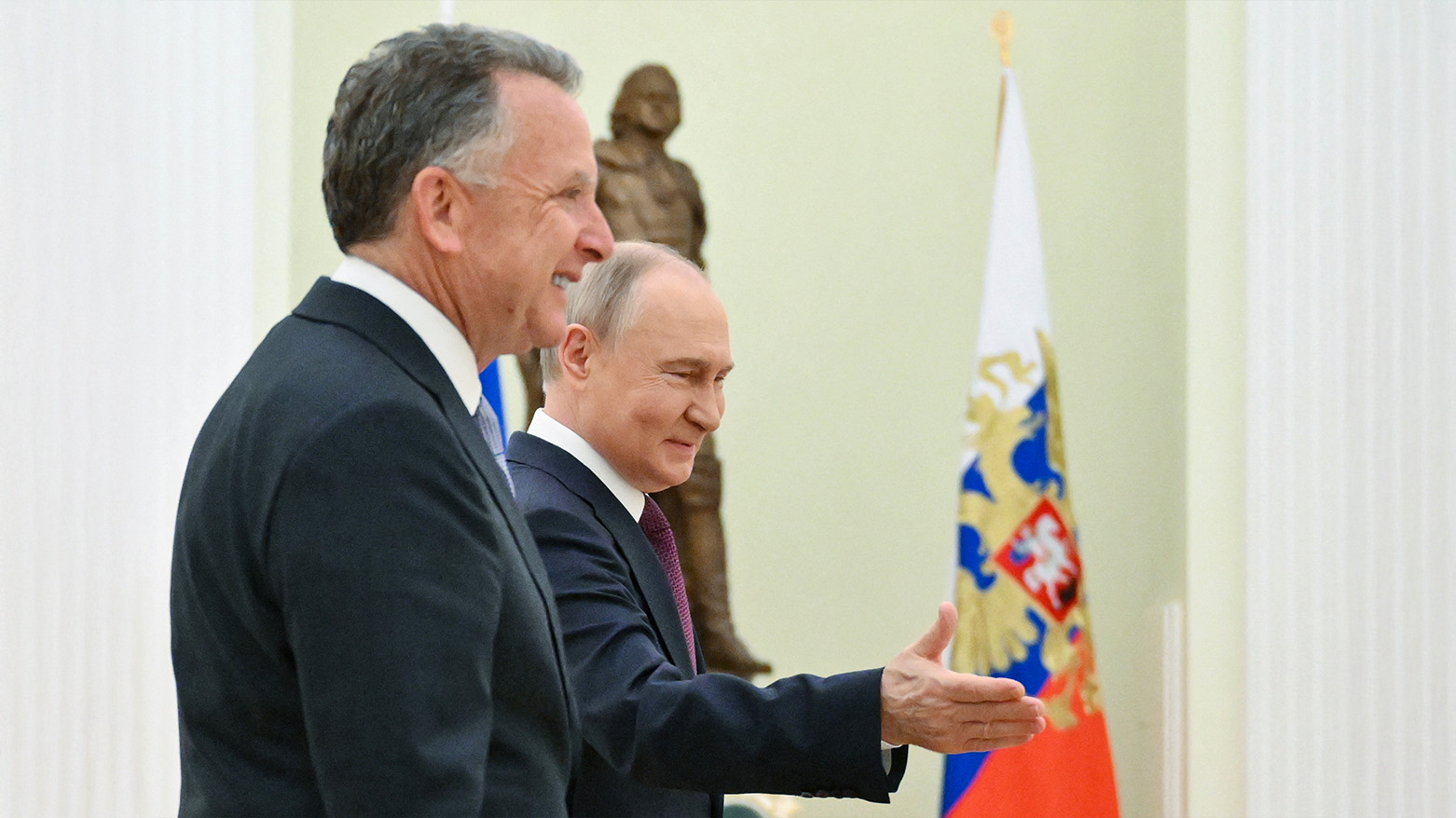'Vladimir, STOP': Trump Envoy Meets Putin in Moscow to Push for Ukraine Ceasefire
According to Kremlin aide Yuri Ushakov, the conversation was “constructive and very useful,” with both parties focusing on mechanisms to revive stalled diplomatic channels between Moscow and Kyiv.

By Kamaran Aziz
ERBIL (Kurdistan24) – In a dramatic turn in U.S.-Russia diplomacy, Steve Witkoff, U.S. President Donald Trump’s special envoy and longtime confidant, met for three hours with Russian President Vladimir Putin in Moscow on Friday to discuss what the Kremlin described as “the possibility of renewing direct negotiations” between Russia and Ukraine. The high-stakes meeting, which came amid escalating violence, may mark the most serious U.S. engagement with Moscow over the war in Ukraine since the conflict began in 2022.
According to Kremlin aide Yuri Ushakov, the conversation was “constructive and very useful,” with both parties focusing on mechanisms to revive stalled diplomatic channels between Moscow and Kyiv. The meeting occurred one day after a Russian missile strike on Kyiv killed 12 civilians and as Russian authorities reported the death of a senior general in a car bombing outside the capital, an attack they blamed on Ukrainian intelligence services.
Witkoff’s trip—amid a backdrop of mounting regional instability and renewed Western scrutiny—comes as Trump is pushing for a ceasefire in the grinding conflict that has left tens of thousands dead and displaced millions. While Washington has kept the details of its peace proposal under wraps, sources close to the Trump administration, speaking to the Wall Street Journal, indicate that the White House is considering a controversial compromise: freezing the current frontlines and formally recognizing Russian control of Crimea in exchange for a cessation of hostilities.
According to Le Figaro, these proposals, often referred to as the “Witkoff plan,” also include provisions favorable to Moscow, such as the de facto recognition of Russian control over four other partially occupied Ukrainian regions—Donetsk, Luhansk, Zaporizhzhia, and Kherson. In contrast, a revised document drafted by Ukrainian and European officials reportedly avoids any such recognition and defers territorial issues until after a ceasefire.
The Witkoff plan also rules out Ukrainian membership in NATO, offering instead vague “strong security guarantees” backed by European allies—but without U.S. participation. The European-Ukrainian counterproposal, however, calls for unrestricted military cooperation and forward deployment rights for allied forces.
On the issue of sanctions, the U.S. proposal seeks a full lifting of all sanctions imposed on Russia since 2014, while the European side suggests a gradual easing tied to Russian compliance and the provision of financial reparations funded by frozen Russian assets. As reported by Le Figaro, the split highlights a growing divergence between American and European strategies on Ukraine.
During the talks in Moscow, Witkoff raised Trump’s growing impatience. Following the Kyiv strike, the U.S. President took to social media, directly addressing Putin: “Vladimir, STOP! Let’s get the Peace Deal DONE!” The message marked one of Trump’s most public and pointed interventions in the Russia-Ukraine war since returning to office.
Trump, in a TIME magazine interview published Friday, appeared to signal a willingness to accept Russian sovereignty over Crimea, stating, “Crimea will stay with Russia. And Zelensky understands that.” The comment triggered fresh waves of concern in Kyiv, where Ukrainian President Volodymyr Zelensky has consistently ruled out conceding territory, including Crimea. However, Zelensky has also acknowledged in recent months that diplomacy may eventually be required to reclaim certain Russian-occupied territories after a ceasefire.
Despite Trump’s frustration, Moscow has shown little willingness to rush into a deal. As the New York Times reports, Putin has increased airstrikes on Ukrainian civilian targets while expressing confidence that Trump’s alignment with key Russian demands—especially on Crimea and NATO—places Moscow in a stronger negotiating position. Kremlin aides have described Putin’s calculus as one of tactical patience: escalate the pressure while keeping diplomatic channels open.
Witkoff’s language on the “so-called five territories” has also drawn criticism from Zelensky, who accused the U.S. envoy of “spreading Russian narratives.” Ukraine’s resistance to territorial concessions remains firm, with officials insisting on a ceasefire before any discussion of permanent borders.
In parallel, The Wall Street Journal reports that Trump’s envoy offered Moscow a U.S.-Iran nuclear compromise proposal that would allow Tehran to operate a civilian nuclear program under strict conditions. Though unrelated to Ukraine, the proposal reflects the administration’s broader bid to present itself as a deal-making force in multiple conflict zones.
On Friday, as Witkoff was in Moscow, a Russian general was killed in an explosion that authorities blamed on Ukrainian intelligence—underscoring the volatility of the current moment. Meanwhile, the U.S. has scaled back military aid to Ukraine and suspended certain intelligence-sharing operations, a move that analysts interpret as further pressure on Zelensky to accept a U.S.-led peace framework.
At a symbolic level, Witkoff’s Moscow visit coincided with the anniversary of the first U.S.-Soviet meeting in World War II—a fact that Russian officials highlighted as a sign of “shared hope for postwar peace.” But beneath the symbolism, the substantive gaps remain wide.
According to the New York Times, Putin is likely to continue military operations until Ukraine and its allies are forced to concede. Despite Trump’s assurances, the Kremlin has yet to offer any major compromises. Still, Trump continues to frame his push as a race against time. “If we don’t make a deal,” he warned, “I’ll be leading the pack.”
As the U.S., Russia, and Ukraine assess the results of Friday’s meeting, the fate of a war that has reshaped global politics may hinge on what comes next in this high-stakes diplomatic struggle.